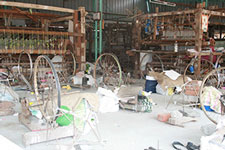Résumés > On the use of handicrafts for state-making in India
Vendredi 7 novembre 2025 - 9h45-10h30
Raphaëlle KOGEL, PhD Student, Laboratoire d’Anthropologie des Enjeux Contemporains, University Lumière Lyon 2
In India the process of state-making takes place at different levels of society, with the aim to produce national unity amidst local diversity (Jaffrelot, 2019). The handicraft industry is rooted in local structures and knowledge, and its commercialization on the local and global markets participate to the Indian outreach. Yet, postcolonial Indian state-making is sometimes expressed in ethnonationalist policies such as the promotion of State Handloom Manufactures and State Handicraft Shops. Within the handicraft sector, localities are chosen to promote Indian values, sometimes to the detriment of a locality’s long-standing cultural history.
This presentation explores how in India state-making operates through its cultural policy. The case of pashmina weaving, historically anchored in the regions of Jammu-Kashmir and Ladakh, illustrates how retellings of origins and practices in these localities do not align with the prevailing conception of Indian identity.
In recent years, the state has supported a newly established Ladakhi branch of pashmina production, thereby positioning the Union Territory as a proponent of national heritage in contradiction to Kashmiri tradition – since the community is already targeted by anti-Muslim policies in a region characterized by geopolitical tensions. By this move, cultural policy has become an actor in the regional rivalry and a vector of legitimization and delegitimization (Polyani, 2001[1944]) India’s handicraft policies engage in the appropriation and rewriting of local practices, imposing the ideal of a unified cultural identity while actually exercising othering within its own borders (Dumont, 1991[1985] ; Graeber, 2022[2001]). This analysis of state involvement in the pashmina industry across multiple scales will demonstrate the production of national unity as a narrative, whilst highlighting the political redefining of difference. In this context, state-making is achieved through the rewriting of imaginaries to reshape local practices and refocus the view of handicraft production through an Indian lens.
Bibliographie
- Dumont, L., 1991[1985], Essais sur l’individualisme. Une perspective anthropologique sur l’idéologie moderne, Éditions du Seuil, Paris, 310p.
- Graeber, D., 2022[2001], La fausse monnaie de nos rêves. Vers une théorie anthropologique de la valeur, Les Liens qui Libèrent, 257p.
- Jaffrelot, C., 2019, L’Inde de Modi. National-populisme et démocratie ethnique, Fayard, Paris, 352p.
- Polyani, K., 2001[1944], The Great Transformation. The political and economic origins of our time, Beacon Press, Boston, 317p.
|


